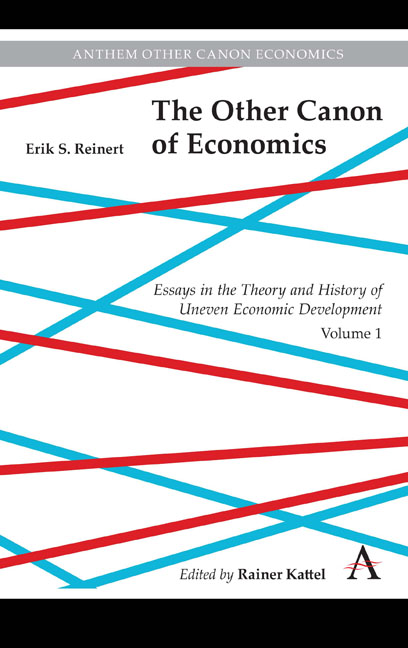Book contents
- Frontmatter
- Dedication
- Contents
- Introduction
- Chapter 1 Catching-up from Way Behind. A Third World Perspective on First World History
- Chapter 2 Recent Trends in Economic Theory — Implications for Development Geography
- Chapter 3 A Schumpeterian Theory of Underdevelopment - A Contradiction in Terms?
- Chapter 4 Competitiveness and Its Predecessors - A 500-Year Cross-national Perspective
- Chapter 5 Diminishing Returns and Economic Sustainability: The Dilemma of Resource-based Economies under a Free Trade Regime
- Chapter 6 Economics: ‘The Dismal Science’ or ‘The Never-ending Frontier of Knowledge’? On Technology, Energy and Economic Welfare
- Chapter 7 Production Capitalism vs. Financial Capitalism – Symbiosis and Parasitism. An Evolutionary Perspective and Bibliography
- Chapter 8 Globalization in the Periphery as a Morgenthau Plan: The Underdevelopment of Mongolia in the 1990s
- Chapter 9 Increasing Poverty in a Globalized World: Marshall Plans and Morgenthau Plans as Mechanisms of Polarization of World Incomes
- Chapter 10 An Early National Innovation System: The Case of Antonio Serra’s 1613 Breve Trattato
- Chapter 11 Innovation Systems of the Past: Modern Nation-States in a Historical Perspective. The Role of Innovations and of Systemic Effects in Economic Thought and Policy
- Chapter 12 The Other Canon: The History of Renaissance Economics
- Chapter 13 Benchmarking Success: The Dutch Republic (1500–1750) as Seen by Contemporary European Economists
- Chapter 14 Mercantilism and Economic Development: Schumpeterian Dynamics, Institution Building and International Benchmarking
- Chapter 15 Development and Social Goals: Balancing Aid and Development to Prevent ‘Welfare Colonialism’
Chapter 14 - Mercantilism and Economic Development: Schumpeterian Dynamics, Institution Building and International Benchmarking
Published online by Cambridge University Press: 13 April 2024
- Frontmatter
- Dedication
- Contents
- Introduction
- Chapter 1 Catching-up from Way Behind. A Third World Perspective on First World History
- Chapter 2 Recent Trends in Economic Theory — Implications for Development Geography
- Chapter 3 A Schumpeterian Theory of Underdevelopment - A Contradiction in Terms?
- Chapter 4 Competitiveness and Its Predecessors - A 500-Year Cross-national Perspective
- Chapter 5 Diminishing Returns and Economic Sustainability: The Dilemma of Resource-based Economies under a Free Trade Regime
- Chapter 6 Economics: ‘The Dismal Science’ or ‘The Never-ending Frontier of Knowledge’? On Technology, Energy and Economic Welfare
- Chapter 7 Production Capitalism vs. Financial Capitalism – Symbiosis and Parasitism. An Evolutionary Perspective and Bibliography
- Chapter 8 Globalization in the Periphery as a Morgenthau Plan: The Underdevelopment of Mongolia in the 1990s
- Chapter 9 Increasing Poverty in a Globalized World: Marshall Plans and Morgenthau Plans as Mechanisms of Polarization of World Incomes
- Chapter 10 An Early National Innovation System: The Case of Antonio Serra’s 1613 Breve Trattato
- Chapter 11 Innovation Systems of the Past: Modern Nation-States in a Historical Perspective. The Role of Innovations and of Systemic Effects in Economic Thought and Policy
- Chapter 12 The Other Canon: The History of Renaissance Economics
- Chapter 13 Benchmarking Success: The Dutch Republic (1500–1750) as Seen by Contemporary European Economists
- Chapter 14 Mercantilism and Economic Development: Schumpeterian Dynamics, Institution Building and International Benchmarking
- Chapter 15 Development and Social Goals: Balancing Aid and Development to Prevent ‘Welfare Colonialism’
Summary
In most arts and sciences – from astronomy to zoology – the Renaissance represents a qualitative watershed in human history, and historians are generally united in considering it a period of unprecedented intellectual ferment. Echoes of da Vinci, Galileo and Machiavelli still resound in the way we approach art, science and human coexistence, and it is noticeable how these developments came ‘out of Italy’ (Braudel 1991). As a precondition for this, the Renaissance was also a period when the productive powers of small European city states allowed a large part of the population to live free from poverty. Where feudalism had provided wealth for the very few and misery for most, the city states of the Renaissance for the first time witnessed a situation where artisans, merchants and public employees filled the ranks of a new middle class.
The Debate on Mercantilism: A Brief Overview
In this picture, the economics profession stands out with a completely different view of the period. The fact that 300 years of economic theory and practice tend to be lumped together under the label of ‘mercantilism’, as if it were a homogeneous mass, alone points to a rather superficial treatment of a long period with much variety. The common view today is that mercantilism was ‘an irrational social order’ (Ekelund & Tollison 1981: 6), the basic feature of which was that economists collectively made the serious mistake of confusing gold with wealth. This practice is referred to as the ‘Midas Fallacy’ (chrysohedonism), after the mythological king whose touch converted everything to gold. Starting with Adam Smith, this Midas Fallacy has been the common interpretation of mercantilism, the one also found in today's histories of economic thought. The Midas Legend had, however, been known as a warning since Roman times, and the mercantilists themselves used it to explicitly refute this view of wealth (Barbon 1696). Two American authors have offered what appears to be an alternative interpretation of mercantilism, that of a society seeking rents, presumed to be non-productive (Ekelund & Tollison 1981).
Both these standard interpretations, of mercantilism, and of pre-Smithian economics in general, present us with serious problems.
- Type
- Chapter
- Information
- The Other Canon of EconomicsEssays in the Theory and History of Uneven Economic Development, pp. 451 - 474Publisher: Anthem PressPrint publication year: 2024



